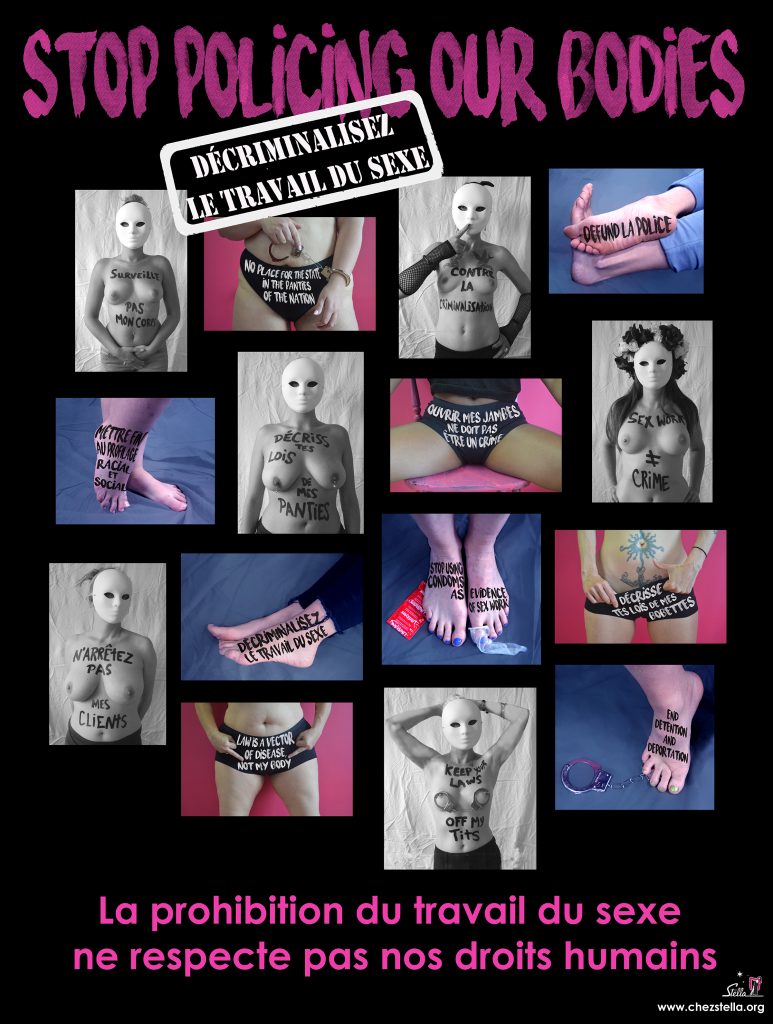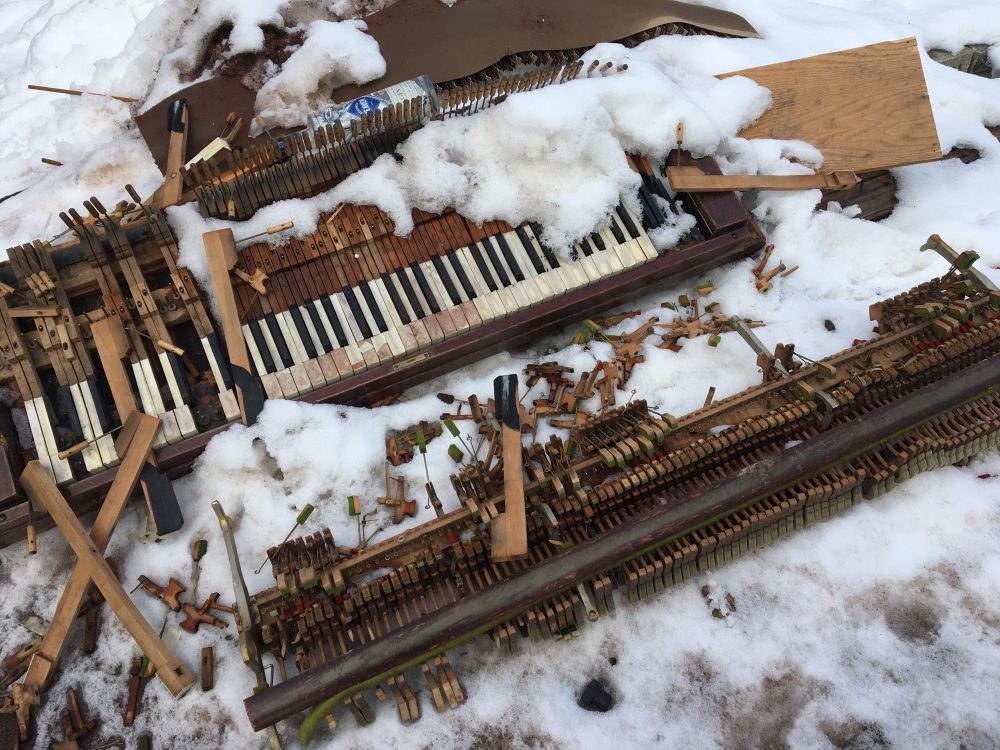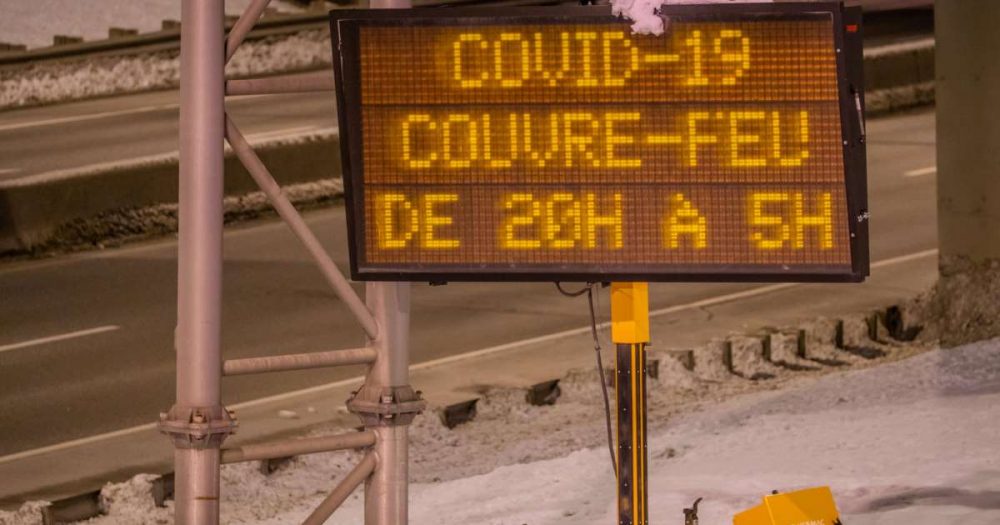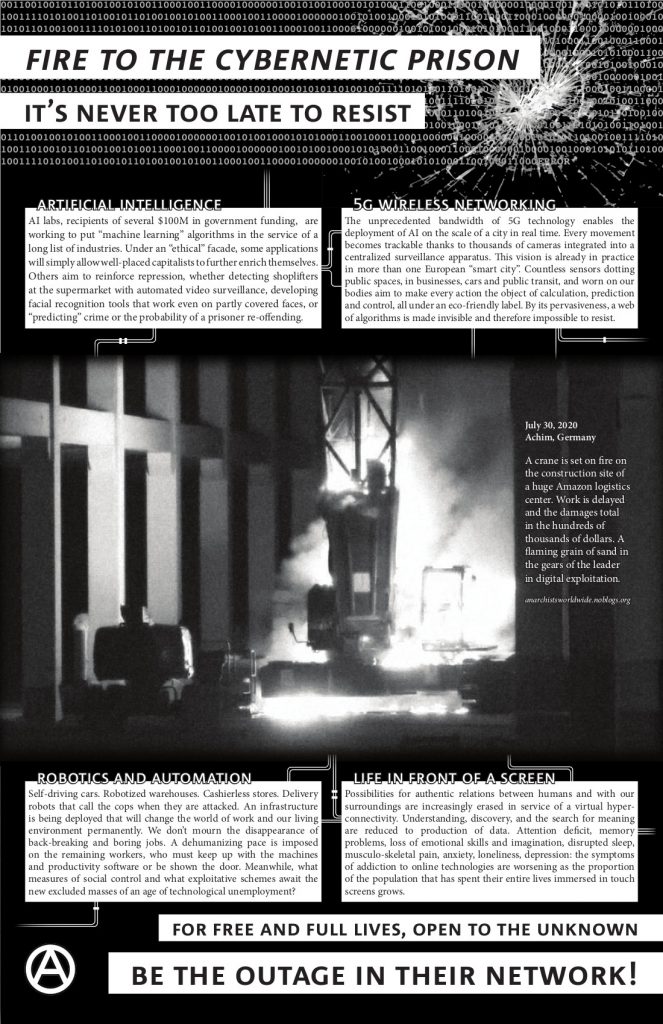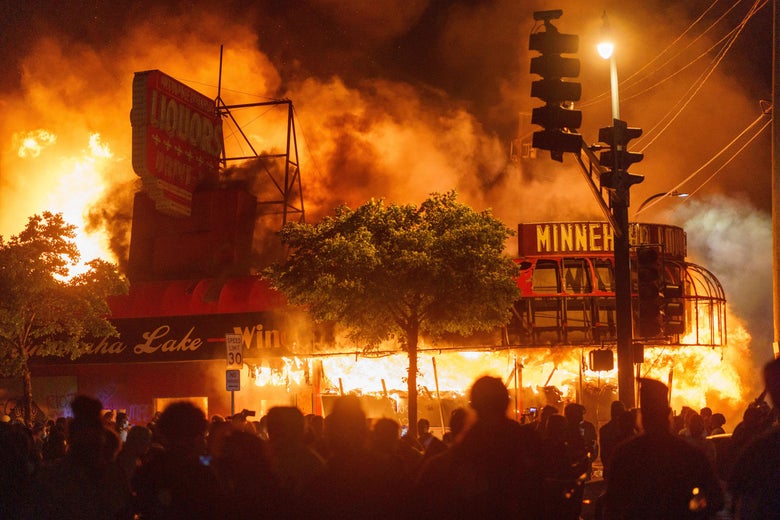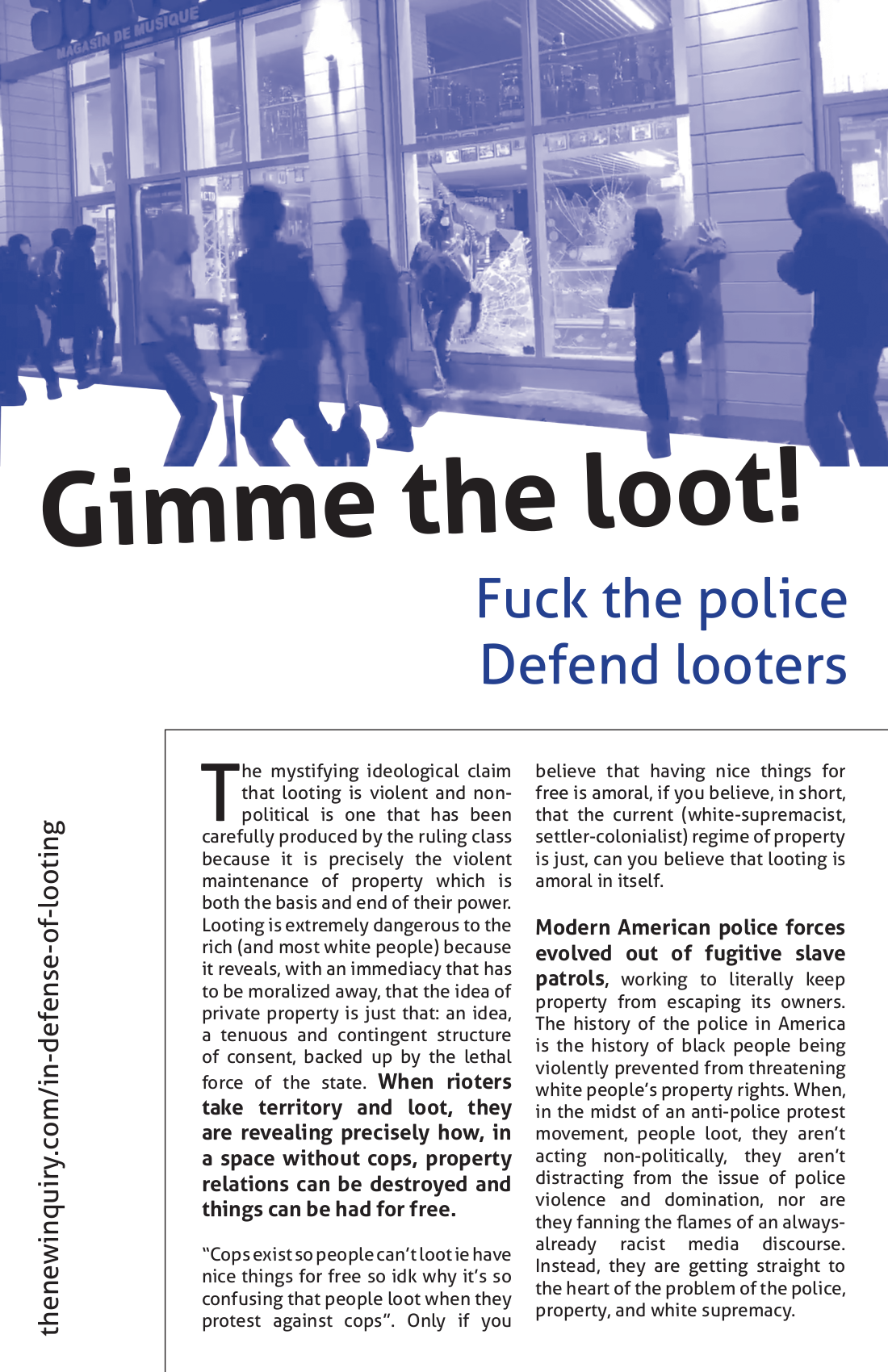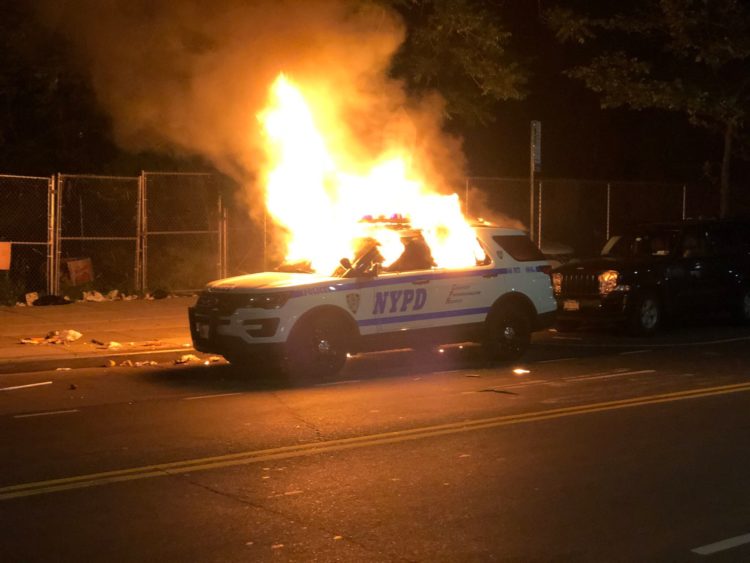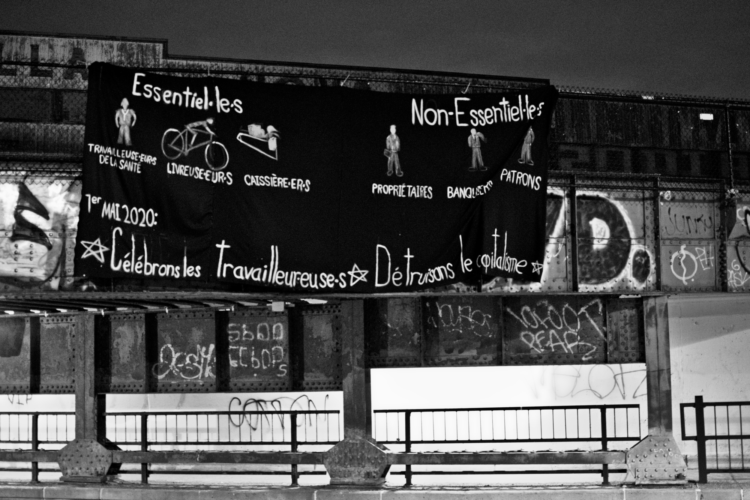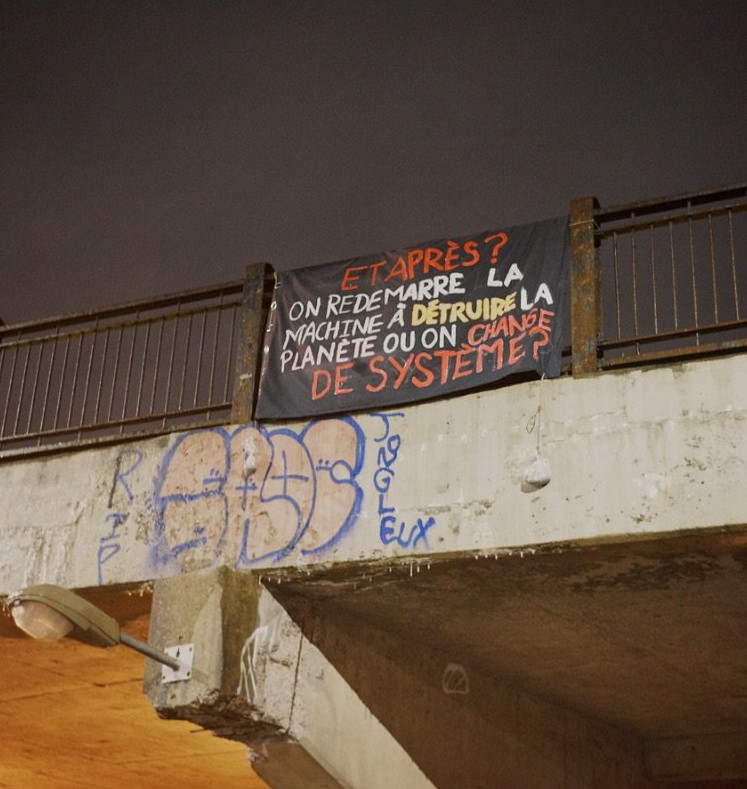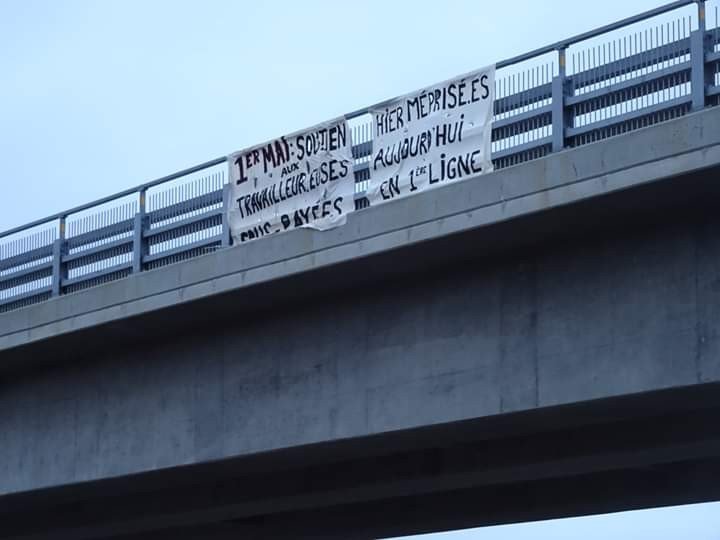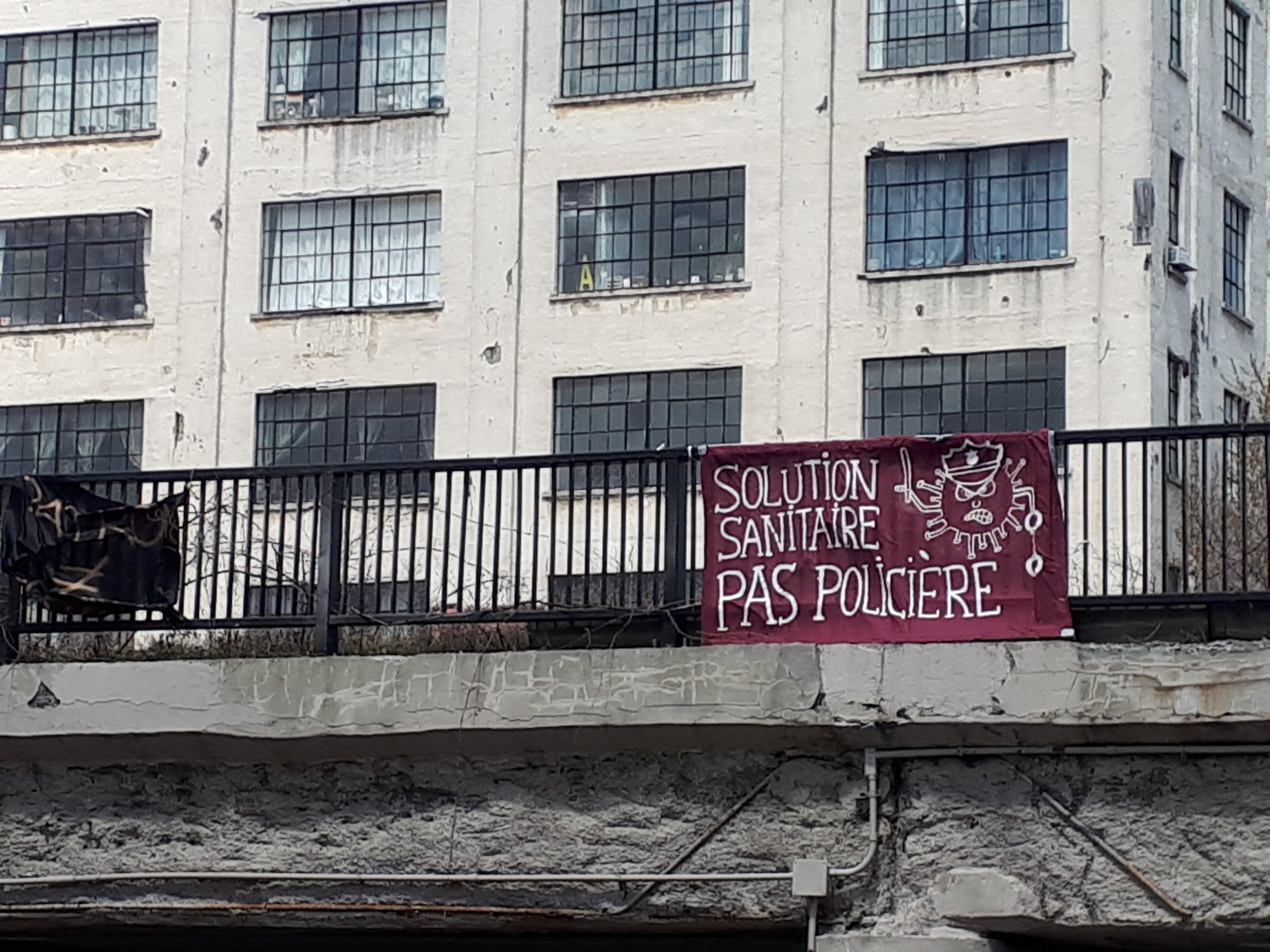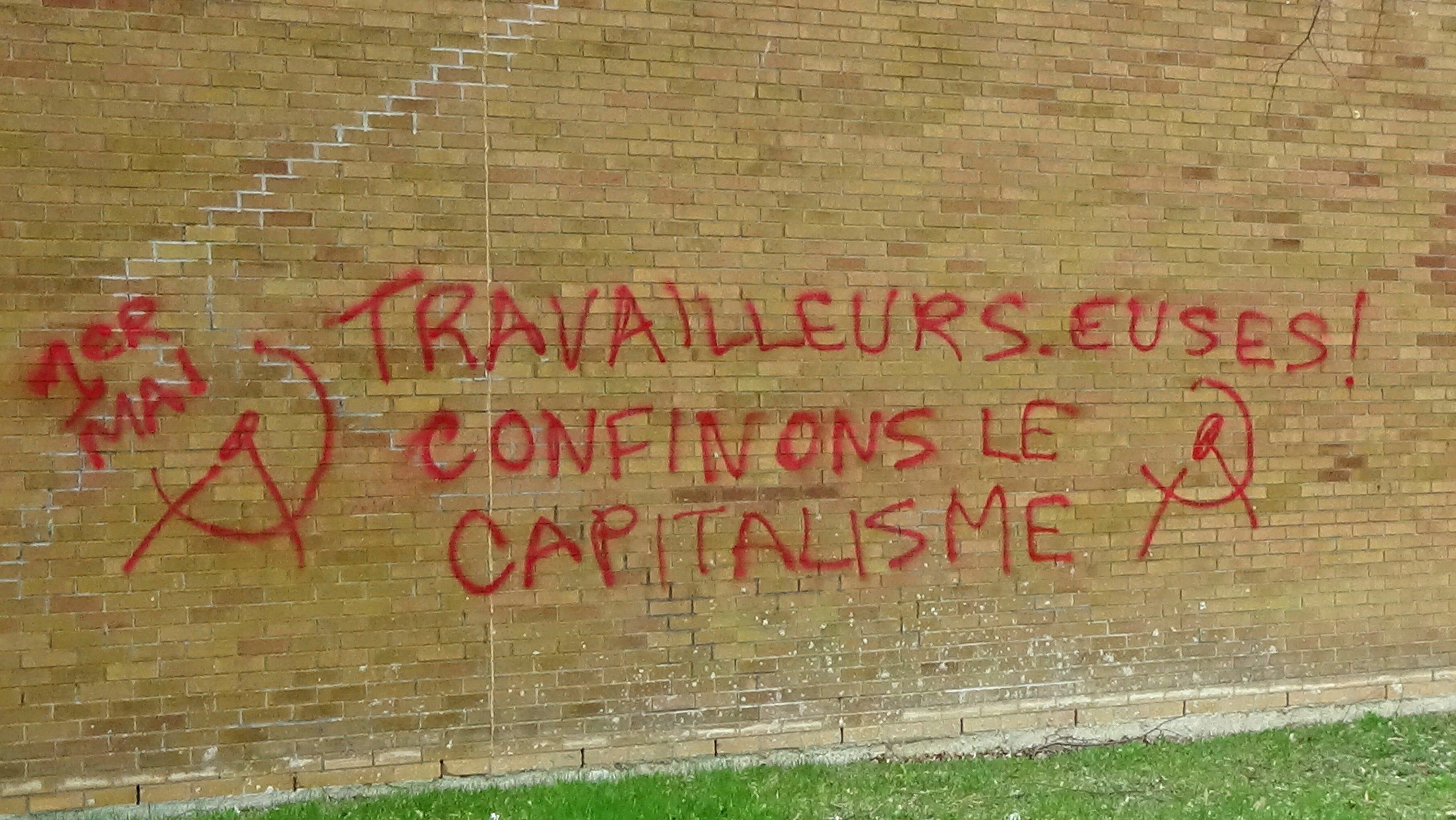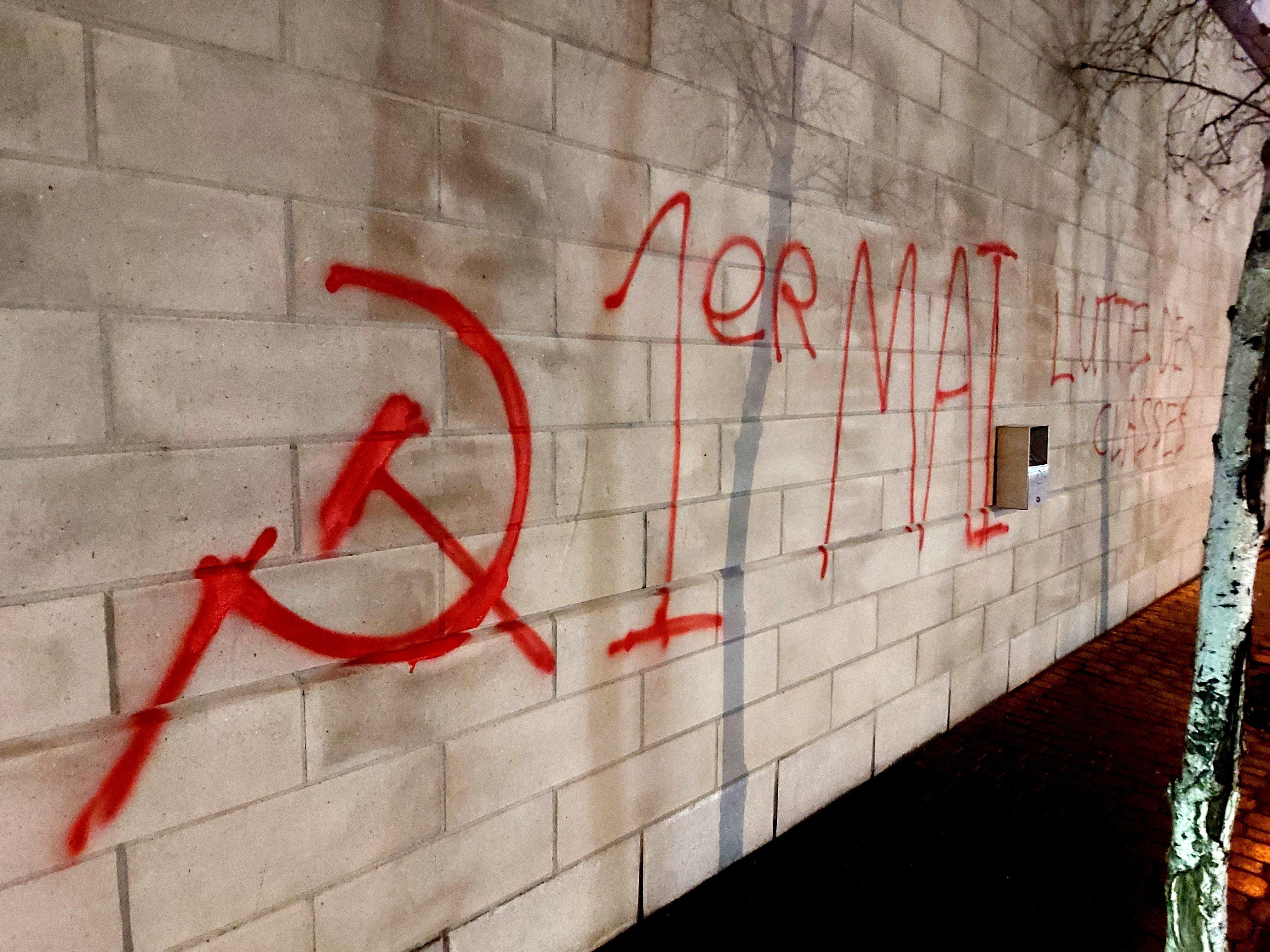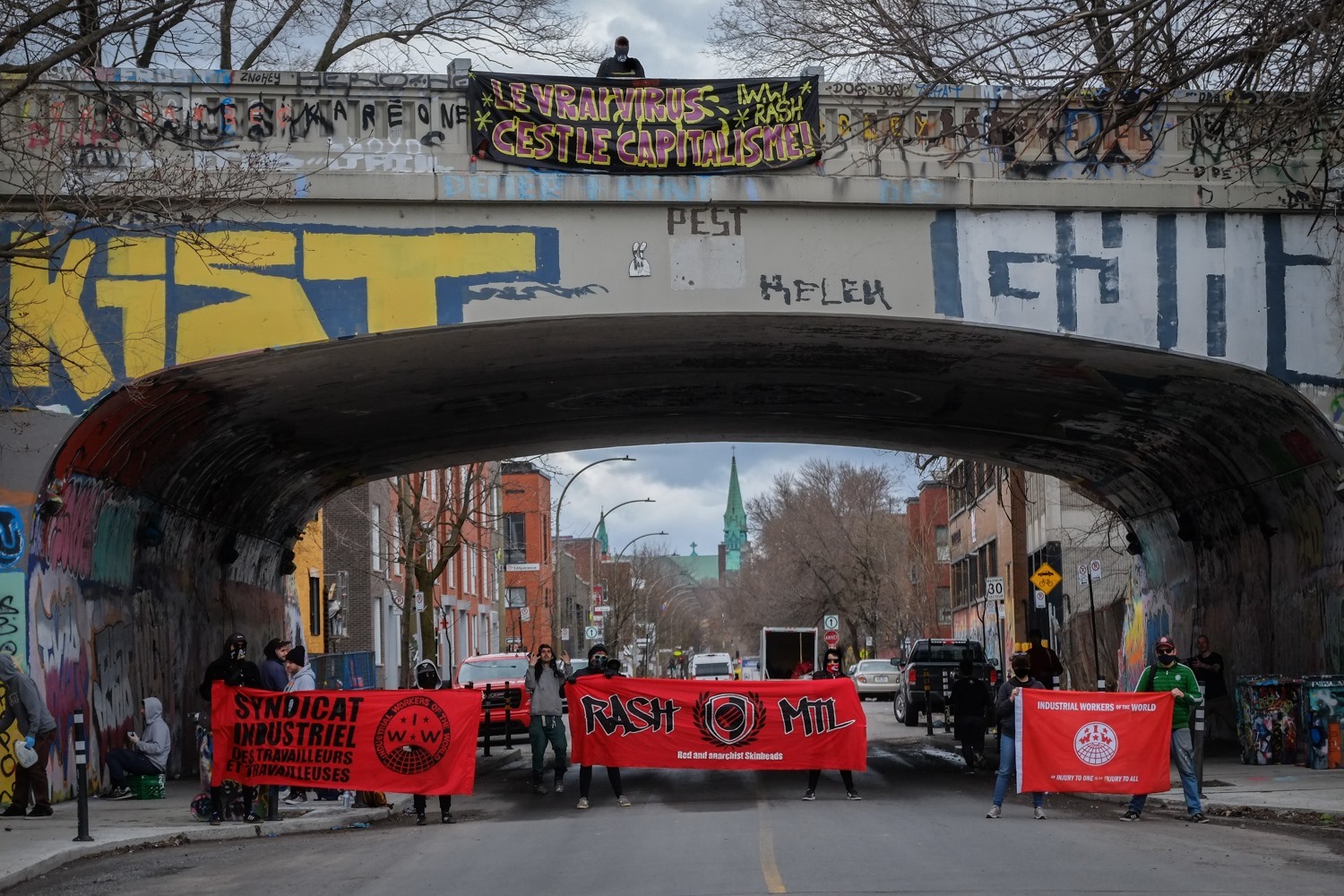
From la revue Ouvrage
Interview with Cari Mitchell from the English Collective of Prostitutes
By the Sex Work Autonomous Committee, an autonomous political organization of sex workers based in Montreal with the aim of demanding the decriminalization of sex work, and better working conditions in the sex industry more broadly.
Cari Mitchell is a former sex worker and a member of the English Collective of Prostitutes (ECP), a network of sex workers in the United Kingdom working both outdoors and indoors campaigning for decriminalisation and safety.1
In 2000, the ECP organized a sex workers’ strike that was part of the Global Women’s Strike on International Women’s Day. The Global Women’s Strike is an international network campaigning for recognition and payment for all caring work. A sex/work strike was organized again at that date in 2014 and 2019, on these occasions, with other sex workers’ organizations. We asked Cari Mitchell to share her experience as one of the organizers of the strike.
CATS: Your collective has existed for many years and used many political strategies to obtain rights for sex workers. How did the strike come up as a tactic to obtain decriminilization of sex work?
C.M.: Our collective which started in 1975 was founded by immigrant sex workers. From the beginning we demanded the abolition of the prostitution laws and for money in women’s hands from governments so we can get out of sex work if and when we want. It was and still is mostly women that are doing sex work, mostly mothers, mostly single mothers, doing our best to support our families. In the ECP we also fight legal cases against criminal charges such as loitering and soliciting and brothel keeping. Whatever people come to us with, we help them. We are an organisation of different nationalities, races, ages, sexualities and all genders.
We work closely with other organizations. We are part of the Global Women’s Strike and the campaign for a Care Income Now2. Like other women we want our work of giving birth and raising the next generation to be counted, valued and paid for. And as sex workers we know that if we had that money for the work we are already doing, most of us wouldn’t have gone into prostitution in the first place. We wish that those people who complain about the number of women who have to go into sex work because of poverty and lack of economic alternatives, would instead press the goverment for that money.
We are based at the Crossroads Women’s Centre in London and work closely with Women Against Rape, which is an anti racist, anti-violence against women organization. We also work with disability organizations – we have a number of women in our own network who have disabilities or who have children with disabilities, which is why they are working to get the money to cover the extra costs of dealing with a disability. Queer Strike which is part of the LGBTQ movement in the UK are also allies as is Support Not Separation which fights against children being taken from their mothers – which is happening here at frightening rates, the excuse being given that mothers are not protecting children against poverty or domestic violence. This is so outrageous. We know of sex workers who only started working to support their children and then have had them taken away by social services saying they are unfit mothers!
We have an international network so we learn from everyone’s experiences. Our sister organization in San Francisco is USPROS (The US PROStitutes Collective) and EMPOWER is our sister organisation in Thailand – who are involved at the moment in the massive struggle for justice in that country.
We campaign for decriminalisation along the lines of the law that was introduced in New Zealand in 2003 which has been shown to improve sex workers health and safety. The law removed consenting sex from the criminal law which means that the police now have to prioritise our safety rather than prosecute.
Women going on strike to demand recognition for their unwaged and low waged work has quite a long history. In 1975, all the women in Iceland went on strike and the whole country ground to a halt. It was fantastic! There are photos of thousands of women out in the streets. Newscasters had to have their children with them in the studio while they were reading the news about the women being out on strike!
People have always known that withdrawing our labour is a way of bringing attention to the issues we want to raise. On International Women’s Day in 2000, the Global Women’s Strike was organizing a women’s strike in many countries calling on governments to recognise and value all the unwaged work women are doing in the world. UN figures at the time showed that women are doing two thirds of the world’s work for just 5% of the income and 1% of the assets. We were already working with sex workers in Soho, London – one of the most well known red light areas in the country. Sex workers there had been part of our network for decades and we had fought a number of campaigns with them against the local Westminster Council trying to close down flats – trying to gentrify the area. Many of the women working in Soho are migrant women and the police targeted them in particular for raids, arrest and deportation but used as an excuse the claim that women were trafficked and needed saving. When we spoke with them, sex workers from Soho said they wanted to join the International Women’s Day strike. Women there work in walk-up flats – the clients come and knock on the door and wait. On the Strike day those doors were closed and Soho sex workers came together with others who worked in different places and ways. We all joined the Global Women’s Strike.
So that no-one could be identified, all the people on the march wore masks. No-one could tell who was a sex worker and who wasn’t, it was a fantastic success and there was a lot of publicity.
In the ECP we try to bring out the truth about sex work- about who we are and why we are doing it so people can have more of an understanding. We talk about the effects of criminalization on our safety and how we are workers just like any other workers, that most of us are supporting families both in the UK and in other countries as well. There are so many migrant sex workers sending money home to countries all over the world. These messages came across in our demands in the Strike in 2000 which was a great leap forward.
We continued to work with sex workers in Soho as Westminster Council continued to pursue them. Some flats were closed and women were driven out onto the streets. Tragically, one woman was murdered in 2000, shortly after the Strike. She was very well known within our network, we knew all about her. Her name was Lizzie and she was murdered while working on the street shortly after being forced out of a Soho flat. No sex worker has ever been murdered while working in a Soho flat. It is 10 times more dangerous to work outside than it is to work indoors with others.
The prostitution laws make it unlawful for sex workers to work together for safety, they drive the industry underground and so make us all vulnerable to violence. Under loitering and soliciting laws – just standing on the street and talking to a client, sex workers can be taken to court and convicted on the word of a single police offier. Once you have a conviction you have a criminal record under sexual offences and it’s pretty much impossible to get out and get another job. So you’re stuck. The police now often use civil orders which also force women to move out of areas they are familiar with and into darker side streets. If you work in a group for company and safety your colleagues can take your client’s car registration number when you get in the car and you can make sure he knows this. But that’s not possible if you have to work by yourself in a dark area to avoid coming to the attention of the police. Where police continue to crackdown, violence and murder of sex workers rises.
Indoors, it’s not illegal to exchange money for sexual services, but everything you have to do to work with others is against the law. More than one woman working from a premises is a brothel and arranging for people to work together, advertising, paying the rent is all unlawful under brothel keeping legislation. It is basically illegal to work safely in this country. Working together means people can look out for each other and learn from each other not only how to work more safely but also for instance to get the money first, how to deal with clients, how to do the job in the quickest time. One of the problems with continued police crackdowns is that most sex workers in this country are now having to work on their own.
Things have changed though – years ago sex workers used to be described in the press as vice girls, but that doesn’t happen anymore. The press is much more respectful and the public is much more aware of who sex workers are. They know that a lot of us are mothers, migrants, trans, women of color; they know that we are vulnerable women who have few alternatives to sex work. The strikes have been a really effective contribution towards this change. The more recent International Women’s Day strikes were organized by other sex workers organizations but we were very prominent in them, especially in the 2014 and 2019. We did a lot of organizing to get people out and we were very much out there and they were both a great success. It doesn’t always feel like it but things are moving along.
CATS: Your movement is in favor of decriminalisation and not legalisation. Can you explain why you think this model is the best option for sex workers?
C.M.: Decriminalisation which was won in New Zealand in 2003 has been a verifiable success. It was introduced under health and safety legislation and sex workers there say that they now have more legal and other rights and more protection from violence – they know they will not be prosecuted if they come forward and report violence to the police and under these circumstance violent men are more aware they will not get away with it. This makes an enormous difference to sex workers safety and is a standard we think should be everywhere.
Legalisation is completely different. It’s state-run prostitution. People have to register with the authorities to work legally and most people are unable to do that. Legalisation creates a two tier system where if you can afford to be known to be working you’re ok and you can work in the legalised areas or premises – but most of us can’t come out as sex workers. Who knows what might happen if your child’s school or a social worker or health authorities find out. It’s simply not something most people can do. In those countries where there is legalisation the prostitution stigma remains, most sex workers don’t register with the authorities and continue to work unlawfully. In the well known areas where people work outdoors, someone just walking into the area can be identified as a sex worker. Who can afford that? Internationally, sex workers are not campaigning for legalisation, we’re campaigning for decriminalisation. We want all consenting sex to be removed from the criminal law
CATS: Your strike was part of a broader women strike in the UK and internationally on International Women’s Day to bring attention to labor exploitation in all aspects of women’s lives. How do you think being a sex worker can compare to other feminised labour or unpaid work such as caregiving and cleaning?
C.M.: In lots of ways it’s similar work. Clients come to us not only because they want sex, but also because they want someone who is sympathetic to them, who will listen to them. Maybe it’s for fifteen minutes, maybe it’s for half an hour, maybe it’s an hour, maybe it’s for longer but they want the personal contact, that they are at the center of someone’s attention for that time.
In fact, one of the women in our network did sex work with a client but was also working with him as a care worker. She did both jobs with the same person and said it was much more work doing the caring work then it was doing the sex work.
In 2017, we did a survey which found there were many other jobs that women describe as exploitative and dangerous3. Sex work is one of the most dangerous jobs women do purely because violent man know that they can get away with being violent to us – they know we’re not going to report anything to the authorities because we don’t want to get prosecuted. That’s how it is.
That survey was really illuminating. We launched it in the House of Commons and it’s been very useful to show there are many other jobs that are described by women as being particularly exploitative and dangerous – that sex work is not uniquely exploitative.
In sex work, you can earn a bit more money in a bit less time and that’s very important especially if you’re a mother or you’re doing another job, maybe you’re working in a bank or working another way and you’re doing it to top up your low wages. A lot of people are doing that. Also, if you are a migrant, you don’t have access to jobs in this country in the same way at all. For instance if you’re an asylum seeker you don’t have the right to look for jobs. A lot of people are living in poverty and suffering discrimination – for instance trans people and women of color face racism and other disrimination all the time in the job market – that’s why so many people are driven into the sex industry.
CATS: How is a sex work strike organized concretely? How can you make sure everyone can participate, even the more precarious ones? The whorearchy (the hierarchisation of different types of sex work as some being more respectable such as stripping or camming then full-service sex work, particularly those who work outside) is one of the factors that affects the amount of criminalization someone will experience. Was this an issue while organizing the strike and how can you address this?
C.M.: We’ve been going for a long time and have a really big network around the country – as well as internationally. We’re in touch with people who work outdoors and indoors in many different places and we invited everyone to come to join the 2000 Strike. The organizing meetings were with people who were not only working in Soho but in other places as well. We sat down and made sure that everybody was able to put forward their suggestions. We were very careful to make sure everybody knew that they would not be public on the day, they would not be recognisable and would be able to take part without compromising their security in any way. That they were not going to be identified because everyone would be wearing masks.
People who worked in many different ways including strippers and people working online took part. We were really determined not to be divided. We are all affected by the laws in some way, however we work, but it was very important to us to make sure that people knew we start with the situation of people who work on the street who are most up against the law, are most stigmatised and therefore most vulnerable to the police and to other violence. So people knew we were not going to have any slagging off of anyone about the way they worked, that’s just not on the agenda. We are all doing it for the money because we need that money and we choose to work in different ways, whichever way fits our lives the best. I think that’s one of the reasons why we were successful in organizing the 2000 strike and the subsequent ones. Because people knew that we’re not going to be divided against each other.
CATS: Here in Montreal and Canada, most unions and mainstream feminist organizations are still in favor of the Nordic model. How was it organizing a sex work strike within a bigger feminist movement? How did you find alliance in the left and the feminist movement?
C.M.: Feminists who take a moral stand against prostitution have always been around, but back in 2000, they were not really interested in coming out against us and neither were the unions. Since then Nordic model has been more of an issue and we take every opportunity we can to address it – like going to trade union conferences, speaking out when we’re interviewed with feminists in the press. When you point out that criminalizing clients is going to increase the stigma and drive everybody underground so undermining safety, it’s obvious why we’re against it. Every country where the Nordic model has come in has shown an increase in violence against sex workers. Those women who call themselves feminists and are pressing for the Nordic model are in fact the biggest obstacle to getting decriminalization. If they would go to the government and say ‘Well, we don’t think women should be in prostitution, but we think that women should have money in their hands so they don’t have to do it’, that would be great ! But they don’t – they take a moral standpoint against prostitution and often make a career out of opposing it as politicians or journalists or academics. At the 2000 International Women’s Strike, there were thousands and thousands of women marching. There was the odd group of feminists standing on the edges with some odd placards, but they were never in a position to counter what sex workers were saying publicly.
Women’s safety is something that the government shouldn’t be able to argue about. We have here a prestigious government committee which spent a year doing an enormous piece of research into prostitution and in 2016 recommended that it be decriminalized, both outdoors and indoors. Also, crucially that prostitution records be wiped clean so that sex workers can get other jobs. It also recomended prostitution not be conflated with trafficking. But their recommendations were not taken up – the government saying it needed more research which just meant more money in academic’s hands. But even those academics who did do further research were not able to come up with the kind of counter report they had so wanted to produce.
The laws have to change and they will change. A divorcee used to be called a “scarlet woman” but not nowadays- things are changed, there has been a women’s movement and decriminalization will happen because sex workers are a key part of that international women’s movement.
CATS: The criticism of borders and the way they are almost always excluded in the trafficking discourse seems to be a big part of your campaign. Can you talk a little bit more about that?
C.M.: We have a lot of immigrant women in our network and a lot of them are seeking asylum, running from other countries and trying to survive. Under UK legislation, people making claims for asylum have to live off of 37 pounds a week4, a pittance! So in order to survive and maybe to send some money home, sex work is one of the options people have.
We also know from our experience not only in Soho but also in cities around the country that the police target migrant sex workers under the guise of saving women from traffickers. We have made it a priority to counter that. For instance, in Soho, women say ‘look we are not being forced, we are working here because we need to survive and to send money home to our family. Every penny we earn, we send it home to our family’. The only force sex workers are under is the force is not having enough money to survive without doing it.
The best research has shown that less than 6% of migrant sex workers are trafficked. So when we speak publicly we make sure that we counter the publicity that police get when they raid. And it’s clear that these raids don’t have anything to do with saving any women from trafficking but to aid the immigration agenda of the government – which is to deport as many migrant people as possible. Women who are picked up are often sent to immigration centers and deported against their will. Terrible.
CATS: Now what do you think are the next steps for the sex workers movement in the UK? How does COVID impact the way you mobilize?
C.M.: I’m sure it is the same in your country, but COVID has exacerbated everything. At first, everybody did try to stop working. People were and still are in this horrendous dilemma of either stopping working so you’re not making your family vulnerable to the virus – but then you’ve got no money to feed them. And you can’t pay your landlord if you work indoors. Or you can decide to continue working and have a bit of money but then you have to be very very careful with clients – and the police may come after you.
People who have continued working have taken very careful precautions with clients. During the lockdown, most people have basically stopped because they feared their neighbors or the police or other authorities are going to catch up with them in some way, they will get in trouble with the law and then you have another whole story to deal with.
Some sex worker organizations were doing a great job of raising money for sex workers who were unable to continue working, and we helped distribute that money around to people in our network who needed it. But we decided that as that good work was going on, we would focus on pressing the government to recognize sex workers as workers, to demand an amnesty from arrests, and to demand that sex workers are able to easily access emergency payments. But the government hasn’t done one single thing to enable sex workers to get that money. We made sure with our public campaigning that this point was very prominent and it did bring together some members of parliament. We asked everyone on our mailing list to write to their local MP and press them to raise these matters in parliament, and some MPs did do that. The government got back saying ‘Well people can access a benefit called Universal Credit’ which is a benefit that is very hard to access, takes ages to get to you, and isn’t enough to live on. People in general are much more aware about these very low benefits – so many people in this country are having to rely on them one way or another in order to survive right now.
The pandemic has clarified a lot of issues, starting with how much caring work women are doing, making sure people in communities have enough food, that they are okay. It also clarified the brutality of the government. For example in care homes, elderly people were not protected from the virus at all. They sent people who were positive with the virus from hospitals and into care homes so then of course, hundreds and thousands of elderly people died. But the government was happy – they haven’t got to pay their pension! The government recently announced that billions of pounds are going to the military, so we know that they have the money. They have had to organize a furlough system whereby people get 80% of their salaries if they are temporarily laid off. So we know that the money is there and we know that they have been lying to us when they say there is no money. It is very clear now they didn’t organize to make sure hospital and care home workers had all the protection they needed. It’s the same with sex workers, they don’t really care if we live or die. I think people have even more scepticism about the government than before.
Governments want to keep criminalisation of sex work because they want to keep us all divided, they want to divide us into good girls and bad girls. But we refuse that in the same way that we refuse to be divided as sex workers depending on the different ways we work. In New Zealand, decriminalization hasn’t resulted in an enormous increase of people doing sex work because that depends on the financial situation in the country. It’s just that you are not criminalized for earning money in that way. Governments have to contend with the international sex worker movement and based on safety and rights, we will win.
1 You can learn more about the ECP at https://prostitutescollective.net/
2 Care Income now is an international campaign led by the Global Women Strike that advocates for a care income for all those, of every gender, who care for people, the urban and rural environment, and the natural world. For more info: https://globalwomenstrike.net/open-letter-to-governments-a-care-income-now/
3 The report of the survey – What’s A Nice Girl Doing In A Job Like This: a comparison between sex work and other jobs commonly done by women, can be found on ECP’s website: https://prostitutescollective.net/
4 Equivalent to 64$ CAD



